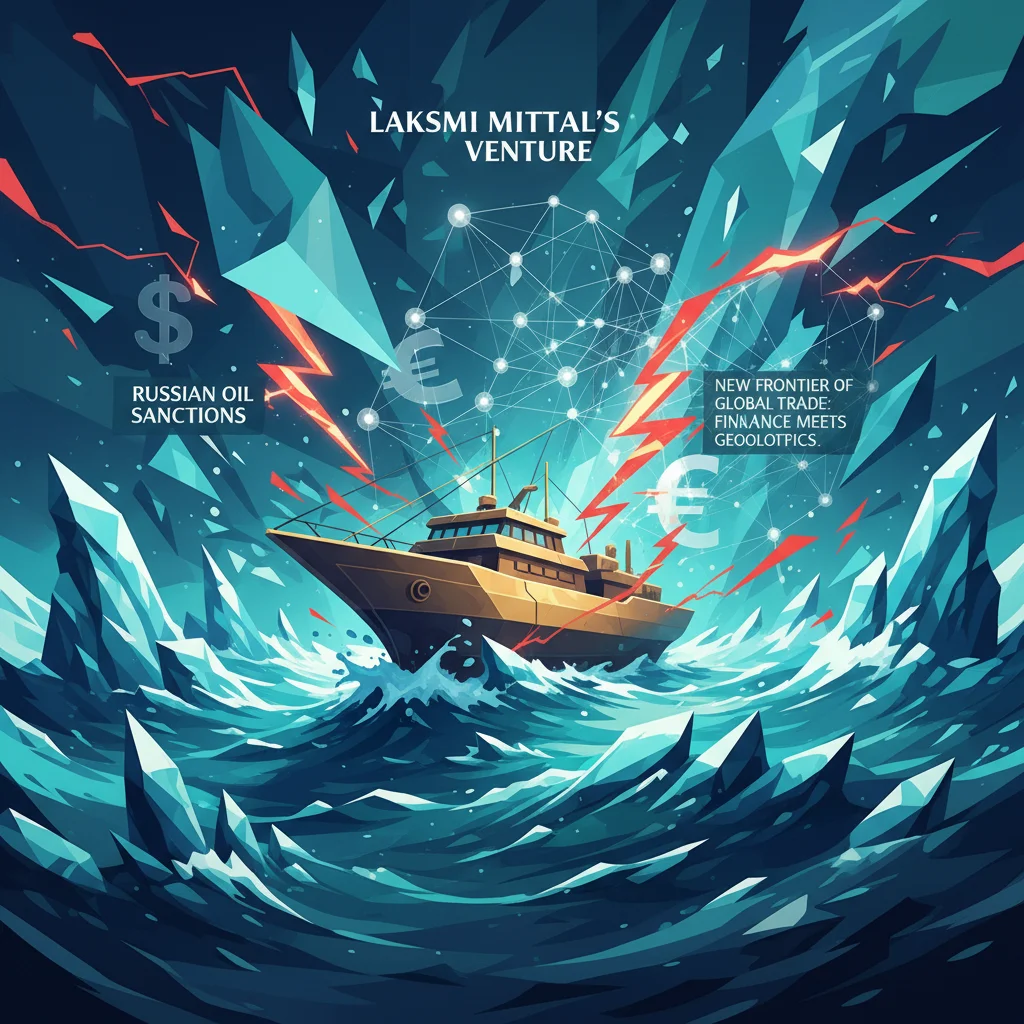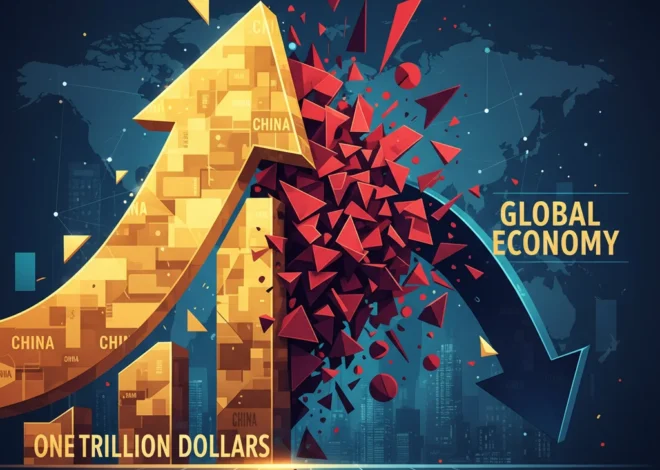
Navigating Treacherous Waters: Lakshmi Mittal’s Venture and the High-Stakes Game of Russian Oil Sanctions
The New Frontier of Global Trade: Where Finance Meets Geopolitics
In the intricate world of international finance and energy trading, a new and formidable variable has taken center stage: geopolitical risk. The once-clear lines of global commerce have been redrawn by a complex web of sanctions, price caps, and strategic allegiances. A recent investigation has cast a spotlight on this new reality, revealing how an Indian refinery part-owned by billionaire Lakshmi Mittal, HPCL-Mittal Energy Ltd (HMEL), received Russian crude oil on vessels that were blacklisted by the United States. This case is more than just a story about oil shipments; it’s a powerful illustration of the challenges and ethical tightropes that corporations, investors, and entire nations must now navigate.
According to a report by the Financial Times, HMEL’s refinery in Bathinda, Punjab, accepted at least four shipments of Russian crude this year aboard tankers owned by Russia’s state-controlled shipping giant, Sovcomflot (SCF). These shipments, collectively valued at nearly $280 million, were transported on vessels that were subsequently placed on the U.S. Treasury’s sanctions list. This incident pulls back the curtain on the opaque world of sanctions enforcement and the sophisticated logistics of the so-called “shadow fleet” designed to keep Russian oil flowing into the global economy.
Deconstructing the Sanctions Labyrinth
To fully grasp the significance of these events, one must first understand the G7’s price cap mechanism. Implemented in late 2022, the policy was designed with a dual purpose: to curtail Russia’s revenue from oil exports, thereby limiting its ability to fund its war in Ukraine, while simultaneously ensuring that Russian oil continued to flow to prevent a catastrophic spike in global energy prices. The cap dictates that Western companies—including those in shipping, insurance, and banking—can only provide services for the transport of Russian crude if it is sold at or below $60 per barrel.
This policy, a novel instrument of economic statecraft, inadvertently spurred the growth of a parallel maritime ecosystem. Russia and its allies began assembling a “shadow fleet” of older tankers, operating with non-Western insurance and financing, to transport oil outside the purview of the G7’s restrictions. Sovcomflot, Russia’s largest shipping company, became a central player in this network. In response, the U.S. has been methodically targeting these vessels and their owners with sanctions to tighten the screws on the price cap regime. It’s a high-stakes game of cat and mouse, with significant implications for the global economy and energy markets.
A Closer Look at the Shipments
The core of the issue revolves around several specific shipments delivered to HMEL’s Mundra port terminal. The timing of the sanctions relative to the loading and delivery of the cargo creates a complex legal and ethical picture. The data reveals a pattern where sanctions were imposed while the vessels were en route.
Here is a summary of the key shipments in question, highlighting the critical timeline:
| Vessel Name | Sanction Date | Estimated Delivery Period | Cargo Details |
|---|---|---|---|
| SCF Primorye | February 23, 2024 | Late February 2024 | Reported to be carrying Sokol crude from Russia’s Far East. |
| Vladimir Tikhonov | February 23, 2024 | March 2024 | Delivered Russian Urals crude. |
| NS Century | October 2023 | January 2024 | This vessel was sanctioned earlier but still completed a delivery. |
| Krymsk | February 23, 2024 | April 2024 | Completed its delivery well after sanctions were imposed on its owner, SCF. |
HMEL stated that it had received legal advice confirming the transactions were compliant, as the company had instructed its trading partners that payment for the crude must be made before the vessels were added to the US sanctions list (source). This defense hinges on a narrow, legalistic interpretation of compliance—that the financial transaction was completed pre-sanction. However, the act of physically receiving cargo from a sanctioned entity, even if paid for earlier, enters a deeply ambiguous territory that regulators and compliance departments worldwide are struggling to define.
Beyond the Scorecard: Rethinking South Africa's Black Economic Empowerment for a New Era
The Ripple Effect: Implications for Investing, Banking, and Global Trade
This incident is not an isolated event; it is a symptom of a broader shift in the global financial landscape. The implications extend far beyond a single refinery or a handful of oil tankers.
- For Investors: The era of evaluating a company based solely on its balance sheet is over. Geopolitical risk analysis is now a critical component of any sound investing strategy. Investors must now ask difficult questions: Does this company have exposure to sanctioned entities? How robust is its compliance framework? A single misstep can lead to reputational damage, regulatory fines, and a significant hit to its position on the stock market.
- For the Banking Sector: Financial institutions that facilitate these trades are under immense pressure. The risk of secondary sanctions—where the U.S. penalizes foreign firms for doing business with sanctioned entities—is a powerful deterrent. This has led to a phenomenon known as “de-risking,” where banks sever ties with clients or entire regions deemed too high-risk. This compliance burden is driving innovation in RegTech, a subset of FinTech focused on helping institutions navigate the complex regulatory environment.
- For the Global Economy: The bifurcation of the energy market—one compliant with G7 rules and one operating in its shadow—creates price distortions and supply chain inefficiencies. While it has kept Russian oil on the market, preventing a price shock, it has also created an opaque and less stable system. This dynamic directly influences global economics, affecting everything from inflation rates to industrial output.
Up in Smoke: Why Big Tobacco's Indonesian Fortress is Starting to Crack
India’s Strategic Balancing Act
India’s role in this new energy order is pivotal. As the world’s third-largest oil importer, its purchasing decisions have a profound impact on the market. Since 2022, India has dramatically increased its intake of Russian crude, taking advantage of discounted prices to fuel its rapidly growing economy. From being a marginal buyer, India has become one of Russia’s most important customers.
This position is a calculated strategic choice. New Delhi has maintained a neutral stance on the Ukraine conflict, prioritizing its own energy security and economic interests while balancing its diplomatic relationships with both Western powers and Russia. HMEL is just one of several Indian refiners, including state-owned giants, that have become major processors of Russian oil. This national strategy, while economically beneficial in the short term, places Indian corporations squarely in the complex geopolitical gray zone, as the HMEL case demonstrates. The country’s banking and finance sectors have had to rapidly adapt to facilitate these new trade flows while attempting to remain compliant with international financial norms (source).
Conclusion: The New Rules of the Game
The story of Lakshmi Mittal’s energy venture and the sanctioned Russian tankers is a microcosm of the new global economic order. It underscores the profound and often-unpredictable ways in which geopolitics now directly intersects with corporate finance, investment strategy, and international trade. The clear-cut rules of the past are being replaced by a fluid and uncertain environment where legal compliance and ethical responsibility are constantly being tested.
For business leaders, investors, and finance professionals, the key takeaway is clear: adaptability and foresight are paramount. Success in this new era requires more than just economic acumen; it demands a deep understanding of the geopolitical chessboard. The tools of modern finance, from sophisticated risk modeling to cutting-edge financial technology, will be essential for navigating these treacherous waters. As the world continues to fragment along geopolitical lines, the ability to manage these complex risks will be what separates the winners from the losers in the high-stakes game of global commerce.
The Washington-Buenos Aires Gambit: Why the U.S. is Betting on Argentina's Risky Economic Revolution


